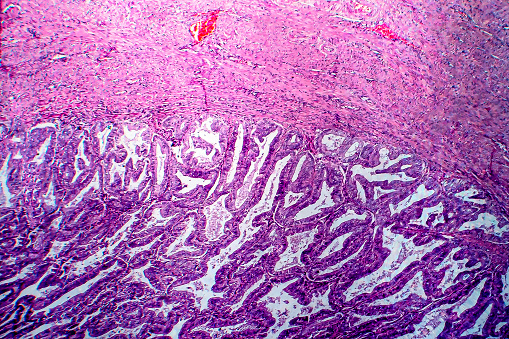In a study reported in the Journal of Clinical Oncology, Léon-Castillo et al identified outcomes associated with molecular subgroups of patients with high-risk endometrial cancer enrolled in the PORTEC-3 trial of adjuvant chemoradiotherapy vs radiotherapy alone.

Photo credit: Getty
Study Details
The study involved data from 410 patients from the trial (210 who received chemoradiotherapy, 200 who received radiotherapy alone) with successful molecular analysis. Immunohistochemistry for p53 and mismatch repair (MMR) proteins and DNA sequencing for POLE exonuclease domain were performed to classify tumors as p53-abnormal, POLE-ultramutated, MMR-deficient (MMRd), or no specific molecular profile. The primary outcome measure was recurrence-free survival.
Key Findings
Overall, tumors in 93 patients (23%) were p53-abnormal, 51 (12%) were POLE-ultramutated, 137 (33%) were MMR-deficient, and 129 (32%) had no specific molecular profile.
Recurrence-free survival at 5 years was 48% among patients with p53-abnormal tumors, 98% for those with POLE-ultramutated tumors, 72% for those with MMR-deficient tumors, and 74% for those with tumors with no specific molecular profile (overall P < .001). Overall survival at 5 years was 54.0% for p53-abnormal, 98.0% for POLE-ultramutated, 81.3% for MMR-deficient, and 88.5% for endometrial cancer with no specific molecular profile (overall P < .001).
Five-year recurrence-free survival with chemoradiation vs radiotherapy alone was 59% vs 36% (P = .019) for endometrial cancer classified as p53-abnormal, 100% vs 97% for POLE-ultramutated (P = .637), 68% vs 76% (P = .428) for MMR-deficient, and 80% vs 68% (P = .243) for tumors with no specific molecular profile.
The investigators concluded, “Molecular classification has strong prognostic value in high-risk endometrial cancer, with significantly improved recurrence-free survival with adjuvant chemoradiation therapy for p53-abnormal tumors, regardless of histologic type. Patients with POLE-ultramutated endometrial cancer had…excellent recurrence-free survival in both trial arms. Endometrial cancer molecular classification should be incorporated in the risk stratification of these patients as well as in future trials to target specific subgroups of patients.”
Tjalling Bosse, MD, PhD, of Leiden University Medical Center, the Netherlands, is the corresponding author for the Journal of Clinical Oncology article.
Disclosure: The study was supported by the Dutch Cancer Society. For full disclosures of the study authors, visit ascopubs.org.

